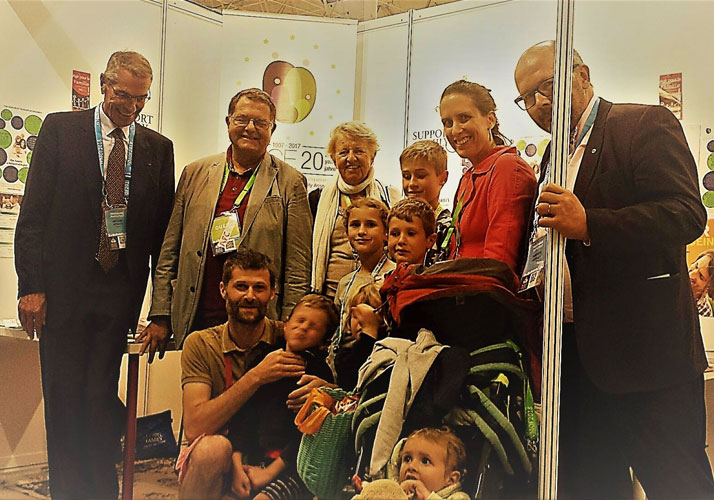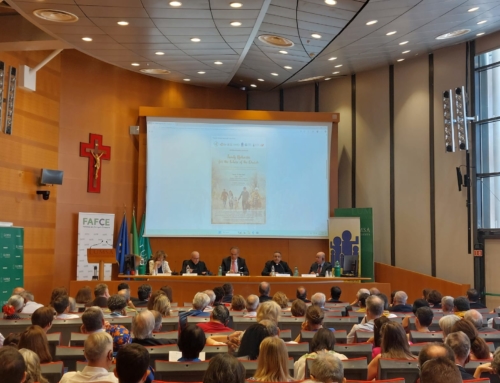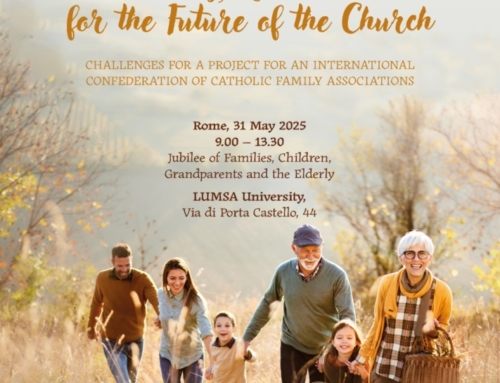Dublin, August 24th 2018
Intervention of FAFCE President, Antoine Renard, at the pastoral Congress of the World Meeting of Families, Dublin, 22-26 August 2018
“It is not good for man to be alone”.
It is also not good for families to be alone; “the family cannot remain isolated like a monad”, said to us the Holy Father in June 2017, “they need to dialogue and to encounter others, in order to build a unity that is not uniformity and that can generate progress and advance the common good”. Family associations offer a framework of assistance and actions to respond to this need, with at their core the strength of the gospel message.
ASSISTANCE
Since at times more than a century, family associations were founded first in order to organise mutual assistance between neighbouring families.
In France, in the 20s, families from the countryside pooled resources to buy a washing machine, which was shared from one family to the next during the week; later people came together to watch television together during family evenings.
By responding to concrete needs, they facilitate mutual exchange, dialog, sharing; they respond to their call: “God has given the family the job of “domesticating” the world”; and they favour a “healthy injection of family spirit” (Amoris Laetitia – AL 183).
This grass roots knowledge through meeting people leads to responding in a natural way to new and varying needs according to the places and times, often before they are cared for by national solidarities.
In Poland, family associations help large families find housing.
In Austria, they use their network to help in welcoming families of migrants.
In the Czech Republic, they come to help young mothers in distress, parents of handicapped children, etc.
Since their beginnings, they have been interested in educational matters, as school is not able to do everything; too often parents feel distressed realizing the scale of the task; yet, the Pope recalls to us that “the overall education of children is a ‘most serious duty’ and at the same time a ‘primary right’ of parents. This is not just a task or a burden, but an essential and inalienable right that parents are called to defend and of which no one may claim to deprive them” (AL 84).
Today, faced with an urgent necessity, many of them, in Germany, in Poland, in France, in Italy propose programs to help with sexual education. “Where sex education is concerned, much is at stake.” (AL 284). Here, family associations come into play, in defence of this fundamental right, to always remember that the one who educates always does so in the name of and at the request of the parents.
ACTION
With their knowledge of the field, the concrete needs of the families of which it is composed, and those with whom it acts, the local family association is able to intervene with the local authorities to propose initiatives facilitating daily life (housing, transport, work, education, health, environment, leisure …)
By grouping themselves up to the scale of a country, they become an interlocutor of the national political authorities who direct and lead the action of the State, which, the Pope emphasizes, “the State has the responsibility to pass laws and create work to ensure the future of young people and help them realize their plan of forming a family” (AL 43).
Saint John Paul II had warned: “families should grow in awareness of being “protagonists” of what is known as “family politics” and assume responsibility for transforming society; otherwise families will be the first victims of the evils that they have done no more than note with indifference” (Familiaris Consortio 44).
In this respect, France is a special place, whose effectiveness in family policy (birth, work of women) is often cited, deserves to be extended: since 1945 the Union of Family Associations has been an institutional partner of the State and a major craftsman of this policy, compulsorily consulted by the government and legislature on any measure affecting the lives of families… This has not, alas, prevented everything bad or allowed everything good.
CATHOLIC FAMILY ASSOCIATIONS
They are not intended to address only Catholic families. Their services are offered to all: here lies an evangelizing force. Indeed, the reference to the Catholic faith is expressed through their political action (not pastoral) and their proposals are based on the Social Teaching of the Catholic Church; it is a rich, comprehensive and coherent source, generally respected as such, including by those who do not adhere to it. This makes it possible to come very quickly to concrete proposals. The associations are only humble practitioners, who find it advantageous not to hide their Christian identity, proud to know this teaching “based on the dignity of the person” as we were told by Pope Francis last year: “Man and woman He created him, in His image and likeness”: when God creates the woman we could say that he creates the family, because both, man and woman, together, are the image of God … In this sense, the family is evangelizing in itself, and family associations are not ecclesial movements or courses of formation in the faith. They only facilitate, precede and follow the work of evangelization that is the duty of every Christian (“Woe to me if I do not announce the Gospel!”, Says Saint Paul in 1 Cor 9,16), and this fire of bringing to all the love of God motivates and provides a solid foundation for those who become part of a Catholic Family Association.
Founded more than 20 years ago, FAFCE regularly brings together the leaders of the Catholic Family Associations of 16 EU countries (a few are lacking…!) to share, educate and prepare useful interventions directed towards the European Institutions (Council of Europe, Parliament and Commission of the EU), in particular to cooperate on the 4 ubiquitous crises across our continent: demography, migrations, work and education.
She has limited means; we often say that if every affected family in Europe gave us one euro a year, we would have more than enough. We could then carry this experience of family associations further in Europe and beyond, showing that “families are not a problem; they are first and foremost an opportunity”(AL 7). With regards to the numerous lobbying groups working in Europe, in Brussels, we have the strength that comes from the Gospel, the Good News, and that gives meaning to our work. Behind us, on our shoulders, when we are working almost alone in Brussels, far from the day-to-day life of the families that we represent, there is people who believe. This people have faith in the true God, a God who, in coming to earth, did not choose to come as a prince or a hero, but chose to come as a child in a family.







